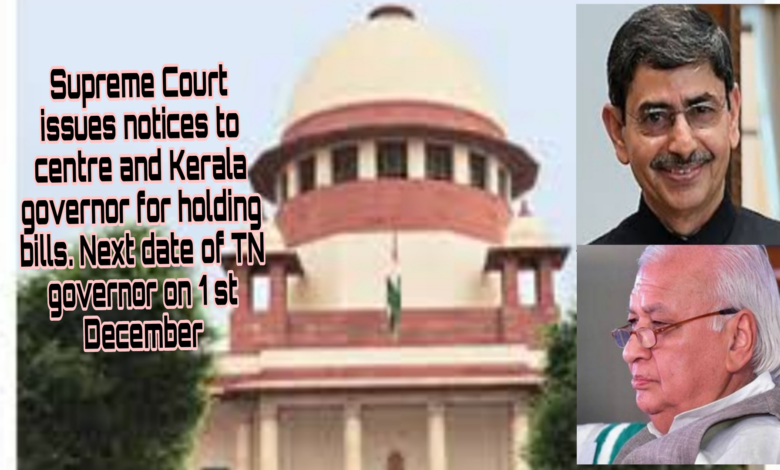
In view of the Kerala governor Arif Mohammed Khan not giving his consent to the bills passed by the Kerala Assembly, the apex court of the country has issued notices to the office of Kerala governor and central government. Kerala is the third state to file writ petitions in supreme Court after Punjab and Tamilnadu.
The Supreme Court’s chief justice D. Y. Chandrachud has directed the Attorney General and Solicitor General to be present with all the facts on 24 th November, the next date of hearing.
The government of Kerala has levelled allegations against the Kerala governor for sitting on the bills passed by the Kerala, assembly and not giving his consent for which he is constitutionally bound to do so. In its petition the Kerala Government has accused the Governor for behaving in an unusual rather dictatorial manner by not giving his consent to the passed bills also amounting to the violation of Constitution’s Article 14 ( Right to equality). Levelling charges of making people of the state rid of their constitutional rights by not giving consent to the bills passed in the Kerala assembly which unambiguously relate to various developmental issues the state government sought immediate justice in this impasse.
Appearing before the three judge bench headed by the CJI D. Y. Chandrachud senior advocate K. K. Venugopal and C. K. Sasi said test the delay has grown to be endemic among governors of certain states further adding that the bills have been pending for 7 to 23 months.
He argued that article 168 clearly says that for every State, there shall be a legislature which shall consist of a governor, and two house to be known respectively as Legislative Council and Legislative Assembly.
The state said that the illegal show of lack of urgency by the governer violated the fundamental rights to life of the people of Kerala.
Arguing on behalf of the government of Tamilnadu the leading advocate Abhishek Manu Singhvi said that till now, fifteen bills are lying pending with the Governor waiting for his consent. Ten bills out of 15 which were sent back by him, have again been sent to the Governor after being re – passed in the assembly.
Giving his point of view the CJI justice DY Chandrachud said that once a bill is sent to the governor after being passed it become more important like a Money bill in which the role of a governor hardly matters.
According to principle, this becomes like a financial bill. The CJI said according to the Article 200’s original part , the governor has three methods, one, to give consent, second, to differ and third to accord his objection.
Can a Governor without sending a bill back to the assembly stop his consent on it? Asked the CJI.
The CJI said that when the Governor doesn’t grant his consent to the bills passed by the assembly, the bill should be sent back to the assembly or shall say that he is sending it to the president of India.
The Attorney General Venkararamani said that the governor is not a technical supervisor.
Singhvi said the Governor of Tamil Nadu has violated every word of the Constitution. He said the pending 15 bills are related to the Vice Chancellor. He added : There is urgent need to reconsider thee bills.
The SC responded that the Attorney General Venkataramani has given the detailed report of the bills lying pending with the Tamil Nadu governor.
The CJI said that the note reveals that from 2020 to 2023 , 181 total bills have come to the governor after being passed by the assembly for consent.
Out of these 181 bills, 152 acknowledged the Governors consent. Five bills are under consideration as the governor has withheld the consent in them.
The CJI said according to the note submitted by Venkataramani AG – on 18 th November a special assembly session was convened. All the ten bills were passed and are now lying pending with the governor, Tamil Nadu.
The AG Tamil Nadu Venkataramani has requested to postpone them till 29 th November, 2023. The CJI has given time to the governer of Tamil Nadu. The next date has been fixed for 1 st December.





